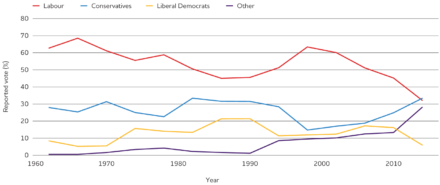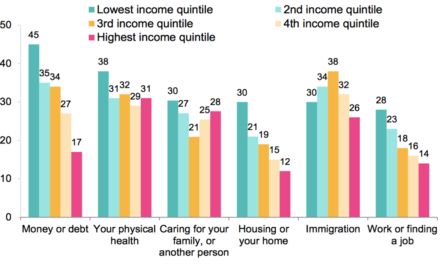One of the central issues facing Labour is whether the party can hold together an alliance between its newfound support and its traditional base. Labour’s unexpectedly high vote at the general election in 2017, where Labour won every age group under 50, masked the further fracture in its relationship with Britain’s working class.
Labour has been losing support amongst working-class voters since 1997. Last year, the Conservatives overtook Labour amongst voters in social grades C2DE, broadly considered to be occupationally working class. This is a serious problem for Labour if it is ever to win a parliamentary majority again.
How the working class voted 1964-2015

There is still a sizeable working class in Britain today, but it has significantly changed. The occupations of heavy industry, which formed the bedrock of the British working class for a century, have given way to a multitude of jobs in today’s economy. Four in five jobs are now in the service sector. Many of those jobs do not pay enough for people to make a decent standard of living and meet their rising costs. And the people being employed to do them are different, too.
This new working class is made up of people living on low to middle incomes, employed as cleaners, shop workers, bar tenders, teaching assistants, cooks, carers and so on. It is multi-ethnic and much more diverse than the traditional working class. It makes up nearly half the population. Despite significant social and economic progress in the last 40 years, it turns out that we didn’t all become middle class. In fact, as wages and living standards continue to be constrained, it is entirely possible that this new working class will become yet more sizeable.
The argument that was once powerfully made by New Labour that society had changed and the Labour Party had not changed with it is true; but this time, it is the failure to respond to the creation of a new working class that is leaving it with an electoral hole.
I charted the values, attitudes and interests of this new working class in my book, The New Working Class: how to win hearts, minds and votes, and recommended policies likely to gain support. There are three main conclusions for Labour (I wrote about conclusions for the Conservatives’ here).
The first is that it is vital to understand the changing working class, its values, attitudes and interests. This new working class is very, very different to the working class that has gone before it and much more diverse. It won’t answer to a label of class but it will pick up on signals – positive and negative – that a party is on their side.
The second is that the values the public associate with Labour are more closely aligned to their own, than the ones they associate with the Conservatives. This should be an advantageous position for Labour, but it is squandered if the party do not hear what matters to the public first.
Six most frequent worries or concerns by income

The final conclusion is that despite deep divisions in British society, there is huge amounts of common ground to unite voters around. The public is very clear what their priorities are, and on what they think about many domestic issues. Vote-winning policies that reflect the public’s actual concerns, from genuinely affordable housing to a day-one employment rights charter, could be taken up but need to not be overshadowed by appeals to narrow party interest.
While elections cannot be won on this new working class alone, as parties must build coalitions in order to win power, understanding the values, attitudes and interests of the new working class is critical to success in British politics, and to Labour’s future as a serious electoral force.
This piece was commissioned by Labour Together, which is guest editing LabourList this week.




More from LabourList
Nudification apps facilitate digital sexual assault – and they should be banned
Diane Abbott suspended from Labour after defending racism comments
Labour campaign groups join forces to call for reinstatement of MPs